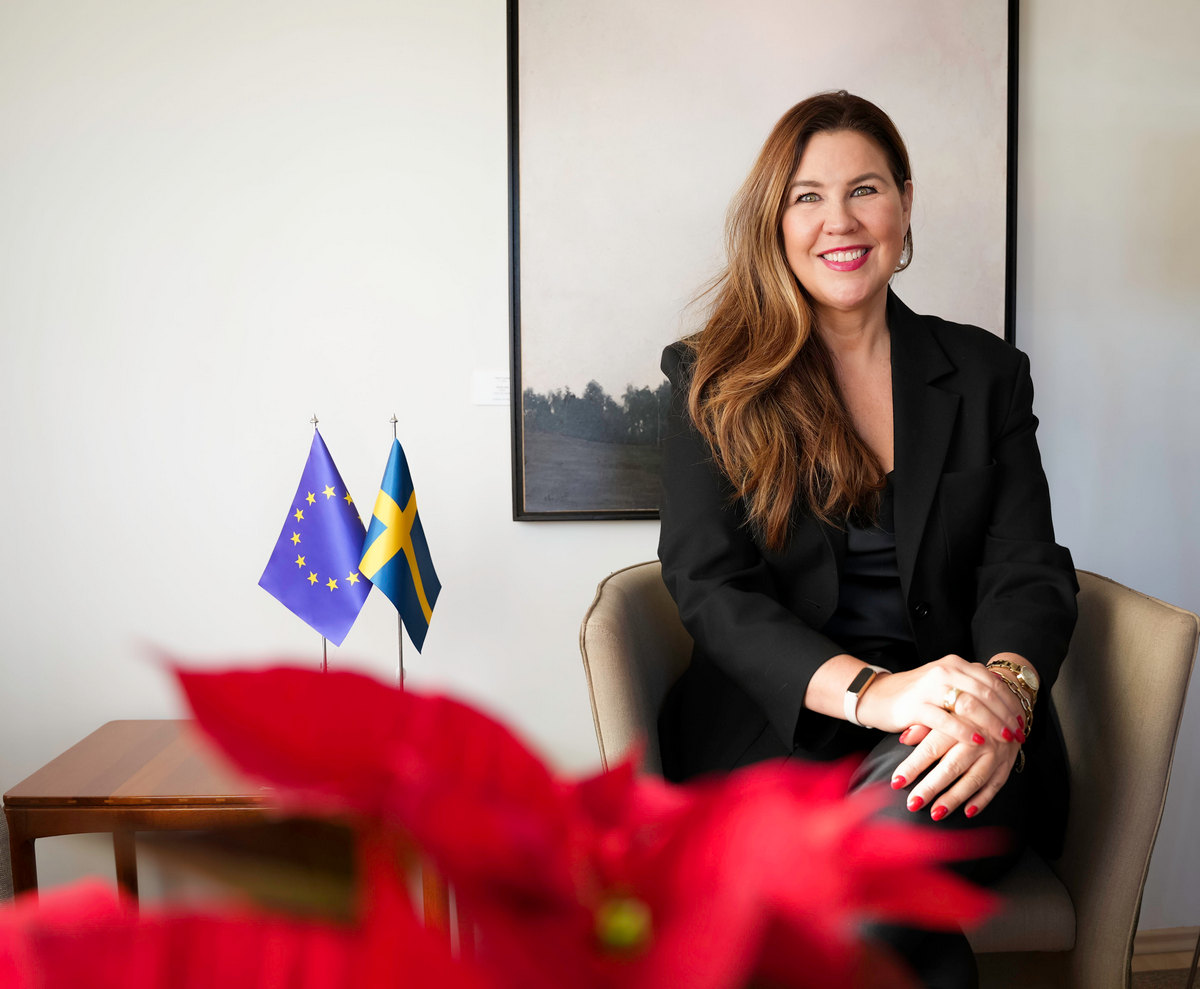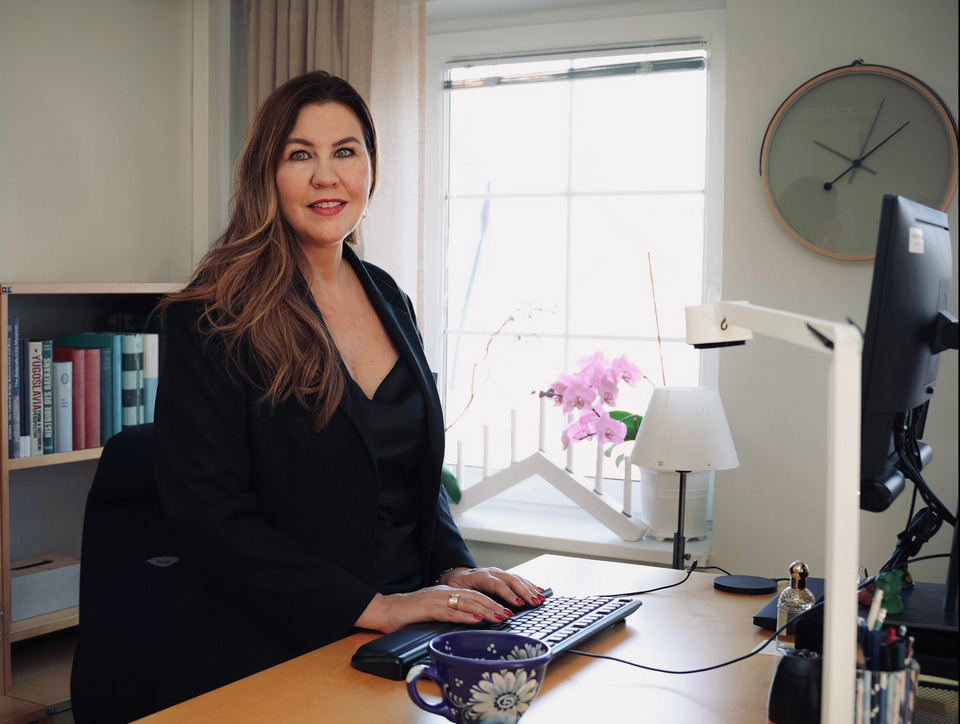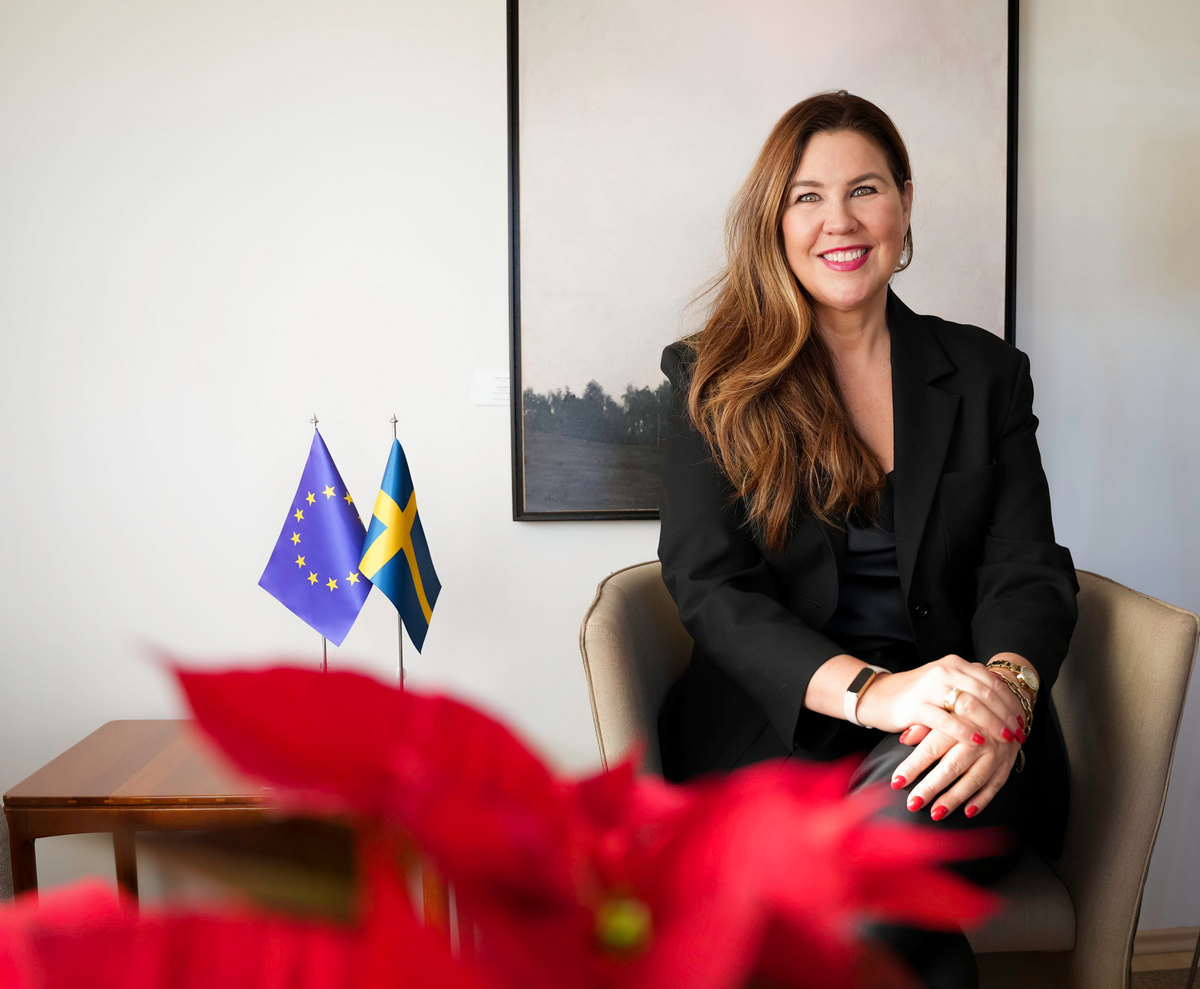Sweden is driving the EU agenda forward, for a greener, safer, and freer Europe

Sweden took over the presidency of the EU at a moment of difficulties for European security due to the war in Ukraine, which has shaped the presidency’s priorities to a great extent. We talked with the Swedish Ambassador to Serbia, Annika Ben David, who shared her thoughts about her country’s EU presidency and its priorities, how Sweden managed to become a leader in ecology, and the new investments in our country.
From January 1, Sweden took over the presidency of the Council of the European Union. What are the priorities of your country during the six-month presidency?
Sweden is driving the EU agenda forward, for a greener, safer, and freer Europe.
We have set four priorities: providing security for EU citizens and strengthening the EU’s role in the world, speeding up the climate transition: fossil-free energy, green jobs, innovation, strengthening the EU’s competitiveness for the jobs of the future, and safeguarding the EU’s fundamental values and stopping organised crime and corruption.
The biggest challenge is obviously Russia’s war against Ukraine. The war defines our presidency.
EU support to Ukraine – political, economic, military, humanitarian, and legal – will constitute a central focus for the Swedish presidency. We welcome that many of our close partners have aligned with EU foreign and security policy positions, as is expected by an EU candidate country. We will continue to call on Serbia to do the same. This is a watershed moment for Europe and the world.
This means that alignment on the EU’s foreign and security policy and meeting EU criteria on the fundamentals with shape opportunities for progress.
The biggest challenge is obviously Russia’s war against Ukraine. The war defines our presidency
How do you currently see Serbia’s position within the framework of EU accession? Do you think the concept of negotiations with the Western Balkans countries should be changed?
The geopolitical realities have brought a new sense of urgency to EU accession. Russia’s war against Ukraine underscores the importance of a strategic partnership between the EU and the Western Balkans. Candidate countries now have an opportunity to advance and we encourage our partners to make use of it.
However, the fundamentals apply: the benchmarks are there. There is a clear path, a clear methodology. We want to see the accession process accelerate, based upon reforms, fair and rigorous conditionality, and the principle of own merits. A strict and fair approach. Serbia also needs to counter the perception that it is siding with Russia. By showing progress, Serbia will make progress on its EU path.
We believe there are strong reasons why countries outside of the EU, wanting in, should have strong opportunities to do so. But there are equally strong reasons why those coming in should be capable of meeting the tough criteria for membership. It will take dedication by the Western Balkans countries to make a case for themselves that they are ready to join the EU. Because the EU is not only a political union. It is a community of values that rests on the rule of law and respect for the rights and freedoms of the individual.
One of the best examples of regional cooperation and good neighborly relations is Scandinavia. How do you assess the current relations in the Western Balkan region? Has there been any progress, and what processes are hindering the reconciliation of the peoples in the Balkans?
There are still numerous challenges in the region, and many of them are quite similar. The overarching issue is the lack of competitiveness and quality of life, which often creates short-term thinking and an overall lack of trust. Building trust by avoiding inflammatory rhetorics and seeking areas of meaningful cooperation is key. There are different examples where even small gestures from ordinary citizens or politicians contribute massively to improving the overall sense of normality. Hopefully, this will gradually lead to more and more individuals, institutions, and enterprises finding reasons to cooperate and move cross the borders, gradually elevating the standard of life. And the EU is doing an important job in trying to help in numerous areas. And frankly, these processes take time. It certainly took us time in the Nordic region, but here we are today.
Let me also add that we are convinced that green experiences from the Nordic region are relevant for Serbia on its path towards a greener future. We have recently completed our joint project “Nordic Green – Solutions for Serbia”. This was an initiative that showcased Nordic green technologies, production methods, and business models to protect the environment, fight climate change and improve sustainability in Serbia.
This initiative was a follow-up to the 2021 project “Boosting Circular Economy in Serbia – Nordic Experiences”. We are most grateful for the financial support from the Nordic Council of Ministers in this regard. We will continue to showcase to our partners and interlocutors in Serbia and the Western Balkans that Nordic countries fully share the vision for a European Green Deal and a greener, non-toxic and resource-effective production process in the coming period.

Sweden is known for putting environmental protection and sustainable development at the top of the political agenda. Do you notice Serbia’s progress in this area, and where do you see the main problems? How did Sweden manage to position itself as one of the leaders in the field of ecology?
For over two decades, Sweden has provided strategic, predictable, and long-term support to Serbia’s reforms necessary towards its EU path. We are Serbia’s assigned lead donor on environment and climate, and the third-largest bilateral donor in total.
Our development cooperation focuses on Chapter 27 – the environment and climate part of Cluster 4. We are also committed to supporting Serbia’s implementation of the EU Green Agenda for the Western Balkans through the EU for Green Agenda in Serbia project. We team up with the government of Serbia, the EU Delegation, UNDP, EIB, Switzerland, and others to make this happen.
In the last few years a lot has been done in transposing environmental legislation; the recent adoption of the national air pollution program is one concrete example. However, as shown in the EU progress report Serbia is still at some level of preparation, with a lot remaining, and we need to step up our joint efforts.
We have seen important progress in implementing requirements for investments not at least in the areas of wastewater and waste management. For example, with EU and Swedish support, Serbia is now building a wastewater treatment plant in the City of Niš, and we have teamed up on a large-scale waste separation reform in 17 municipalities all over the country.
We are Serbia’s assigned lead donor on environment and climate, and the third-largest bilateral donor in total
With more loans and funds available for infrastructure investments in the sector there are important challenges ahead. The institutional resources, including hiring professional environmental experts, need to increase rapidly on the central and local levels in order to plan and monitor the expansive investments and safeguard high environmental standards. If Serbia invested in more institutional resources progress could be faster and better.
Sweden managed to position itself as one of the global leaders in ecology by setting high environmental targets and matching targets with long-term systematic financing schemes, including investments in education and institutional capacity. The strong EU environmental framework, and the close cooperation with neighboring countries, have been key. A critical factor for success is the broad involvement of society in the green transition; people and businesses want to participate and have great solutions and engagement to offer. The Government needs to have a close dialogue with all parts of society.
In the previous period, the growth of Swedish investments in our country was noticeable. More than 100 Swedish companies are operating in Serbia today, employing almost 10,000 people. What are the most significant projects and investments in the plan for 2023 and the following period?
As I said, Sweden’s engagement in the environment and climate in Serbia is long-term and strong. This is certainly one of the key areas where we expect that ongoing Swedish (and Nordic) and Serbian cooperation will facilitate development and expertise while creating better conditions for greater Swedish business engagement in green and sustainable technologies.
Swedish companies operating in Serbia have, in general, a positive view of the business climate in Serbia. This is mainly due to the country’s strategic location, well-educated labor force, good English language skills, investment incentives, and free-trade arrangements with key markets, particularly CEFTA and the EU.
We are witnessing continued growth in the bilateral trade between Sweden and Serbia, which at the end of 2021 amounted to EUR 437 million –an increase of over 22% in comparison to 2020, despite the pandemic. We believe bilateral trade figures for 2022 could be approaching the EUR 500 million mark.
As for some ongoing significant investments during 2023, we hope that IKEA will complete the development of the second phase of its retail shopping park next to the flagship store in Belgrade which will create additional jobs at this location. We are also aware that the Swedish company Rimaster continues to expand its wire-harnesses manufacturing facility in Paraćin, which is great news for that part of Serbia. Another major Swedish company is planning to enter the market by providing reverse vending machine solutions to a client in Serbia.
And we hope to see more Swedish business interest and developments in areas such as software and ICT services, renewable energies and energy efficiency, retail, sustainable mining, and many more innovative areas where Sweden leads the way.
The previous year was marked by the war in Ukraine, which significantly influenced the geopolitical deliberations of a large number of countries, including Sweden. Your country applied for NATO membership together with Finland, which marked the end of nearly two centuries of Swedish military neutrality. How do you see this process?
Russia’s unprovoked and unjustified war against Ukraine is an absolute game-changer for Sweden, the EU, wider Europe, and the world. The new war in Europe defines our EU presidency; how we view ourselves, the world, and what we are doing now and next. It has prompted us to abandon 200 years of military neutrality, which goes to show the enormity of this watershed moment.
The full-scale invasion by a nuclear power on a neutral and democratic Orthodox Slavic brother nation reminds us that freedom and democracy must not be taken for granted. This is an attack not only on Ukraine, but a war on our values, our system of governance, and the norms of international cooperation.
The outcome of this war will shape Europe’s future. Ukraine must win this war, otherwise, it means that invading another country and undermining the rules-based international order pays off. Then it can be done elsewhere, or by others.
The situation requires a unified response. EU support to Ukraine – political, economic, military, humanitarian, and legal – therefore constitutes a central focus for the Swedish presidency.
Sweden’s application for NATO membership is based on an independent, democratically reached decision. Sweden’s membership will strengthen NATO. As a member, Sweden will contribute to the security of NATO as a whole, in the spirit of solidarity.

In a short time, you left a good impression on the Serbian public and became known for your interesting posts on social networks. How do you like life in Serbia and Belgrade? How similar are Serbs and Swedes?
Thank you! Belgrade is a wonderful city to live in. It is at the heart of Europe and there is so much to discover in every direction. It is easy to feel welcome. For someone who likes cafés and culture, it is a great place to live in for a time.
As a diplomat, you have the privilege to be a guest for a few years in other countries, places. That is a chance that you are given, over and over. I am grateful for this opportunity, and I know my now adult children are as well. Every place has its charm. Here, I am encountering so much generosity and hospitality. People in Serbia are informal, just as we Swedes, and it is easy to interact.
But I have one major grievance: the poor air quality. I am suffering for Belgraders. That’s why I am proud that Sweden is Serbia’s biggest donor on the environment and works with the Ministry of Environmental Protection and the University of Belgrade on how to make the air in the city better to breathe.





